Why would anyone want to avoid Amazon?
A one-stop-shop for everything from books to clothes to pillows featuring Nicolas Cage’s face photoshopped onto Kim Jong Un’s head, it has made it possible for almost anything you want to appear on your doorstep the next day.
But worker exploitation, tax dodging and invasions of customers’ privacy are just the tip of the iceberg when it comes to Amazon’s unethical business practices.
And while Amazon.com is their best known venture, they have fingers in more pies than you might expect; services like AWS, Twitch and even IMDb fall under their grasp.
It might seem impossible to remove Amazon from your life if you prefer shopping online—but you can still avoid Amazon to a degree by using some more ethical Amazon alternatives instead.
Amazon: A Brief History
In 1995, Amazon began as an online bookstore operating out of Jeff Bezos’s garage. They were already making $20,000 per week within the first two months.
The company continued to snowball, and Bezos was named Person of the Year by Time magazine in 1999 after listing his company on the stock exchange. Time said that Amazon represented “a sign of the e-world yet to come, a place in which technology allows all of us to shop, communicate and live closer together.”
In the same year, Amazon reported $350 million in losses. However, Bezos was confident that they would be profitable by the year 2000—and they finally began to make a profit in 2001.
In recent years, Amazon’s growth has continued at a startling pace. In 2018 they near-doubled their profits (from $5.6bn to $11.2bn) and left their competitors eBay, Walmart, Etsy, Target, BestBuy behind to become the eCommerce king they are today.
As an eCommerce site, it’s even supplanted retailer Walmart as ultimate capitalist villain.
4 Reasons to Avoid Amazon
Despite the convenience Amazon brings, it’s easy to find reasons to remove them from your life. Here are some of the key issues with the company and their practices:
1. Worker Exploitation
Amazon has been accused of exploiting their global, 650,000-strong workforce in many ways.
In the UK, ambulance services were called out to Amazon warehouses 600 times over a three-year period. To put this number into perspective, there were only eight call-outs in a nearby supermarket’s factory of a similar size over the same period. Why is that?
Working conditions in Amazon’s warehouses can be draconian. UK warehouse worker Aaron Callaway spoke out about how he has to spend ten-and-a-half hours a shift on his feet, moving each item to the correct location in 15 seconds or less—or face a warning from his manager.
Such an exhausting and repetitive role has taken a huge physical and mental toll—“I feel like I’ve lost who I was,” Callaway says.
The conditions in the warehouses of Amazon’s Chinese suppliers are even worse. A 2018 investigation found workers in Hengyang were expected to work a 60-hour week (five eight-hour days, with two more hours of overtime each day and another ten on Saturday) for just 14.5 yuan (£1.66) an hour.
The undercover investigator who infiltrated the factory as a worker found herself expected to clean 1,400 Echo Dot speakers a day, using a toothbrush dipped in alcohol to remove any dust. She recorded her colleagues’ complaints of numb hands and sore necks, backs and eyes from performing the same action again and again for hours on end.
Four-and-a-half hours into her shift, “I was already so tired and my movements growing slower,” she wrote. “I brushed with less and less force. There were 20 or 30 speakers building up in front of me that I had yet to brush clean.” And when she had slowed down from fatigue, her line manager told her to brush faster.
When Bezos last year collected an award for “outstanding personalities who are particularly innovative, and who generate and change markets, influence culture and at the same time face up to their responsibility to society,” he told the audience: “I’m very proud of our working conditions and very proud of the wages we pay”
Earlier this year, when Bezos “challenged other large retailers to raise their minimum wage“, Walmart execs hit back asking Amazon to pay their taxes.
2. Tax Avoidance
Amazon use various loopholes to pay the lowest amount of tax possible. Many big businesses do the same, but Amazon regularly make headlines because of the tremendous amount they hoard. They paid no US federal tax on the $11.2 billion profit they made in 2018, due to unspecified “tax credits” as well as a tax break for executive stock options.
In 2017, the European Commission found that Amazon had benefited from an illegal tax deal granted by authorities in Luxembourg, which allowed the company to reduce its tax bill by €250m over 2006 to 2014.
The case centred around two subsidiaries incorporated in Luxembourg and controlled by the US parent company—Amazon Europe Holding Technologies (described by the commission as “an empty shell”, with no employees or offices) and Amazon EU group, which transferred 90% of its operating profits to the holding company, where they weren’t taxed. Therefore, Amazon paid an effective tax rate of just 7.25%, compared to Luxembourg’s national rate of 29%.
Amazon also make a lot of money from taxpayer subsidies, further rubbing salt into the wound. It’s reported that their HQ2 project—a new corporate headquarters based in Virginia—will cost US taxpayers $4.6 billion, causing politicians from both sides to question the deal.
3. Market Dominance
Amazon have achieved massive growth across many sectors by prioritising size over profit, which gives them a lot of leeway in terms of pricing.
Take Amazon Prime, for example. It’s undeniably a great deal. In the UK, you pay £10 a month as an Amazon Prime customer for unlimited, one-day delivery at no extra cost. This cost the company $28 billion in 2018, but they clearly think it’s worth it in the long run.
This is something smaller businesses or even other eCommerce platforms can’t compete with. So it’s no wonder that many have decided to join the site as third-party sellers: but they’ll have to give up at least 15% of revenue to sell on the site (and this percentage can often be higher based on warehouse and fulfilment costs).
But even if your business decides to sell on Amazon, Amazon will still be competing against your products—and as it’s their platform, the game is rigged in their favour.
Third-party sellers have to communicate with their customers through Amazon’s messaging system, which Amazon monitor. If Amazon believe you’ve violated their rules—by doing something as simple as sending the customer a non-Amazon URL—you can be immediately suspended from the platform.
Amazon’s dominance of the online marketplace has knock-on effects in the real world: the giant pays far less in business rates on its UK properties than most traditional rivals, further strengthening their hand against town centres and malls which already struggle to turn a profit compared to online retailers. Sociologists have long known that in-person shopping generates social and civic benefits for a community.
Stacy Mitchell of the Institute for Local Self-Reliance has been researching Amazon’s business practises for years and is troubled by the way the company seems not just to want to be the top online retailer, but to control the underlying infrastructure of commerce—and beyond.
Because aside from producing hit TV shows and publishing books, Amazon are slowly but steadily expanding their power into the physical world by building out their shipping infrastructure in a bid to supplant the United States Postal Service, as well as making inroads in healthcare and finance.
4. Privacy Concerns
Through the Echo and Alexa, smart TVs and Kindles, Amazon is keen to record as much information about its users as possible. This data can be used to sell products, or sold on to advertisers and marketers.
Amazon-owned smart doorbell maker Ring made headlines early in 2019 when it faced claims that teams had “unfiltered, round-the-clock live feeds from some customer cameras”—including captures from indoors—despite having no need to do so.
Meanwhile, Amazon have patented facial recognition technology which could be used with their doorbell tech—by creating a database of “suspicious persons”, such as convicted criminals or registered sex offenders, it would be able to recognise unwanted visitors.
Although most versions currently lack a camera, the ubiquitous Alexa is also a privacy nightmare. Amazon have admitted that a team of thousands listen to selected recordings captured by the smart speaker, to improve the voice recognition software (these employees work nine-hour days, with each worker listening to as many as 1000 audio clips per shift).
Bloomberg reports that the “teams use internal chat rooms to share files when they need help parsing a muddled word—or come across an amusing recording.” They also claim that “two of the workers picked up what they believe was a sexual assault.”
Other Non-Ethical Amazon Competitors
Walmart
Walmart is a go-to hypermarket for consumers, with not only physical stores worldwide, but also online marketplace Walmart.com. Additionally, Walmart owns the Asda chain in the UK, online retailers Jet.com and Shoes.com, and sells everything from home goods to groceries, clothes, and single-use items.
Although Walmart claims it is increasingly environmentally responsible, with so much ground to cover and a business model prioritising affordable prices, it’s akin to Amazon in terms of predatory pricing allegations, working conditions, and wages.
Newegg
Newegg.com is an online store offering a wide selection of computer hardware, electronics, games, and accessories. It’s known for its good deals compared to other platforms, since it’s a specialist seller. Although Newegg states that it is “dedicated to conducting business in a lawful and ethical manner”, the company hasn’t made any efforts towards sustainability.
eBay
Unlike Amazon, eBay primarily offers third-party sellers a platform to auction secondhand items. However, Amazon and eBay have both evaded taxes, as well as failing to stop sales of invasive plant species which could have a devastating effect on native ecosystems.
AliExpress
Chinese retail tech giant Alibaba’s AliExpress is an online shopping platform quickly gaining traction in the eCommerce world due to its low prices. However, like most large retail companies, AliExpress has been criticised for predatory pricing and mistreatment of employees. Earlier this year, AliBaba’s co-founder Jack Ma defended a 72-hour working week.
Closing Your Amazon Account
There’s much more that could be said about Amazon’s unethical business practises. But if the above is enough to convince you to avoid the company and start using some ethical Amazon alternatives instead, the first step is to close your account.
To close your account completely, you’ll have to contact Amazon directly via their website.
👉 Here’s a good guide that will take you through the many steps you’ll have to go through to get it sorted—it’s almost as though Amazon made it difficult on purpose…
When you do eventually manage to confirm your cancellation, you’ll lose access to any digital content you’ve purchased on the platform, as well as your customer profile and account history.
If you have an Amazon Web Services or Kindle Direct Publishing account, you need to contact those teams separately.
Ethical Amazon Alternatives: Amazon Web Services/Hosting
You might not have heard of Amazon’s cloud platform, Amazon Web Services (AWS)—but, essentially, it powers much of the internet, and handles data storage for everyone from Netflix to the CIA. AWS is where the majority of Amazon’s profits come from.
The bad news is that if you spend any amount of time online at all, it’s almost impossible to avoid coming into contact with AWS.
Netflix, The Guardian, and Airbnb are just a few of the thousands of services built using AWS—if you’re dedicated to fully and completely removing Amazon from your life, you’ll have to limit your internet usage to sites you simply can’t live without.
💡 You can use this tool to check where a website is hosted, and follow these instructions to fully block your computer from accessing any site using AWS on your computer.
(Full disclosure: ethical.net is currently hosted on AWS – but we are looking into alternative options!)
However, if you’re simply looking for Amazon alternatives to host a site of your own on, there are plenty of options available to you:
Kualo
Kualo are a hosting service with a focus on sustainability: they’re 100% green powered, run an energy-efficient data centre and even provide home working for staff to minimise travel
Netcetera
Netceteraboast a zero carbon data centre—they claim to have saved 2.4M KG of CO2 to date. They offer domain names, web hosting, cloud hosting, dedicated servers and data centre colocation. Netcetera’s UK-based Zero Carbon data centre is in the Isle of Man.
GreenNet
GreenNet are a not-for-profit collective, and have been offering hosting to supporters of the environment and human rights since 1985! They worked with organizations such as British Naturalists Association, UNESCO, and End Water Poverty.
Acorn Host
Acorn Host offer green hosting for ethical businesses and organizations only, their ultimate package covers 20GB space and 500 GB bandwidth.
Timpani
For WordPress hosting, the UK-based Timpani was “created by a team of experts with an unmatched knowledge of all aspects of WordPress and cloud technology”. It understands “that WordPress demands exquisitely-tuned security, performance and flexibility. Timpani does this right out of the box. Developers enjoy performant, rock-solid WordPress instances; superb staging and deployment facilities; and support from humane experts.”
It offers two hosting plans, with the cheapest costing £10 per month.
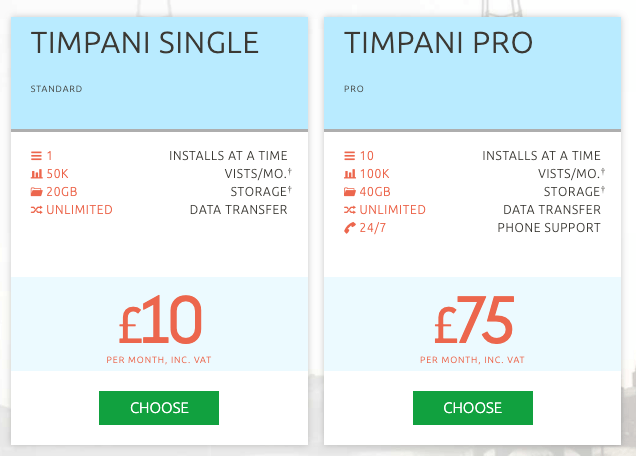
S4 Hosting
S4 stands for “sustainable, speedy, secure and stable”. The company believes in ethical and affordable web and mail hosting, and makes these services easy with human setup, monitoring, and back-ups, plus managed WordPress and WooCommerce hosting for e-commerce and blogs alike.
As for ethical policies, it supports local non-profit organisations and charities by offering subsidised or free web hosting, and donates a minimum of 10% of its annual profits to social, ethical, and environmental good causes.
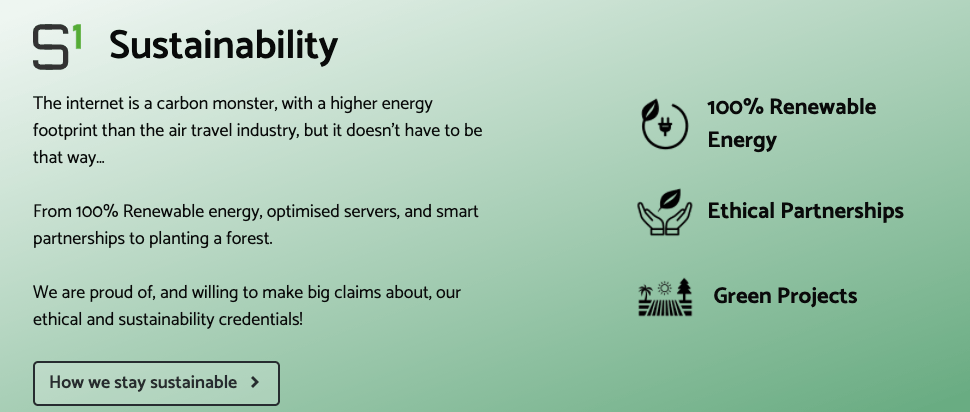
💡 For more recommendations, you can check out the hosting section of our resources page.
AWS might be nigh-on impossible to avoid (and bear in mind that some of the alternatives recommended below might use it!), but it’s much easier to take a stand against the other arms of Amazon’s business.
Take shopping, for example. If you’re willing to pay a little extra and wait just a bit longer for the goods to arrive, there are heaps of Amazon alternatives available to replace four of Amazon’s most popular categories.
Ethical Amazon Alternatives: Buying Books
Originally an online bookseller, Amazon now also offers a large selection of titles for free via Prime. Of course, low fees tend to mean less money for authors and publishers. (Along with refusing to pay any taxes along the way.)
Here are some ethical alternatives for purchasing books, either online or in person:
Book Cities
Book Cities is a non-profit project created to promote independent bookshops.
Available for iOS, its smartphone app helps you discover and search new bookstores. It displays the nearest stores wherever you go (see ‘Near Me’), and gives opening hours, addresses, contact details, and store descriptions.
World of Books

World of Books is a leading, UK-based online seller of used books, with millions of global customers. It distributes directly, and through third-party platforms and wholesale partners. The business supports charities and is a pioneer in the reuse and recycling of unwanted books.
It plans to be carbon neutral by 2022, and you can find out more about its ethical credentials by checking out its Impact Story.
Ethical Book Search

A user contacted us via the comments to share the Ethical Book Search service they have built.
It works as a price-comparison service across a range of independent and/or ethical sellers, which currently includes Better World Books, Biblio, Blackwell’s, eBooks, and Kennys.
The site notes that: “These booksellers are not perfect but they have much better records than many of their competitors.”
Hive
Hive give a percentage of each purchase to an independent bookstore of your choice.
Better World Books
Founded in Indiana, US, Better World Books donate a book to someone in need for every one they sell. They are a certified B corporation since 2008.
Worldcat
WorldCat connects people to the collections and services of more than 10,000 libraries worldwide, helping you find any book you search for at a nearby library.
And a special mention goes to which locates library books near you. Support your local libraries!
Ethical Amazon Alternatives: Baby Products
Amazon makes a killing from baby products, but is there a more sustainable alternative?
Little Green Radicals
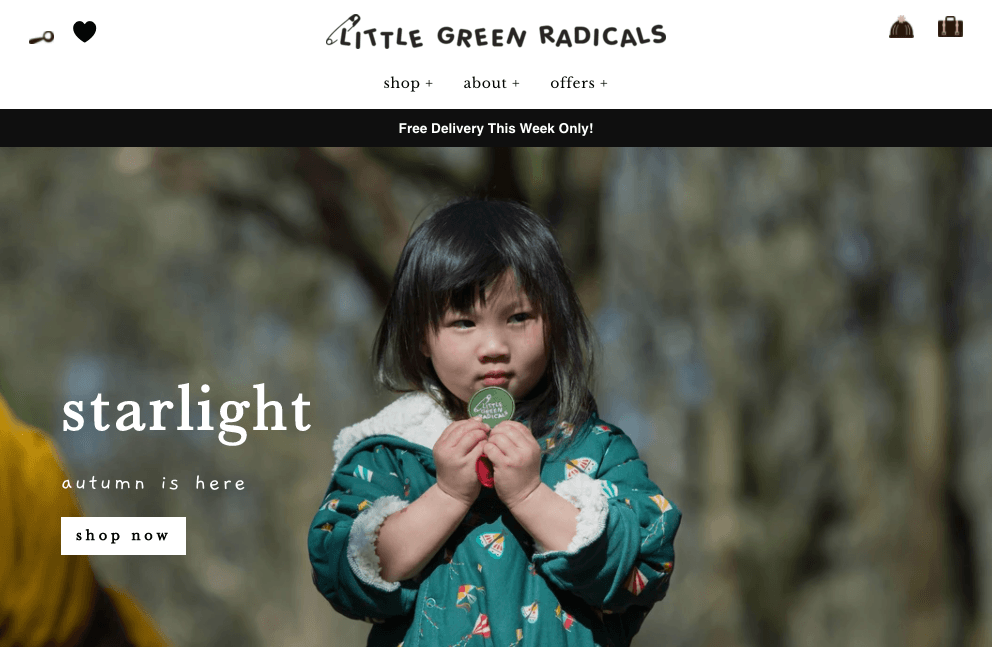
Little Green Radicals also fits the bill.
“From the beginning our clothes have always been organic and Fairtrade. We are energised by a desire to improve what we make, the way we treat the people who make it and our impact on the environment. Our ambition remains for Little Green Radicals to blaze a trail for an ethical fashion revolution.”
Babipur
Founded by wife and husband, the UK company Babipur sell a range of ethically-made baby items; from clothes to food to toys.
Beaming Baby
Beaming Baby are a specialist provider of biodegradable diapers that are toxic-free and environment-friendly.
Ethical Amazon Alternatives: For Buying Jewellery
Jewellery entails its own ethical concerns, especially in terms of how it was created, or where it came from. Then there’s buying jewellery from Amazon, which comes with an additional array of issues including tax, workers’ rights, and everything else mentioned above.
Yala
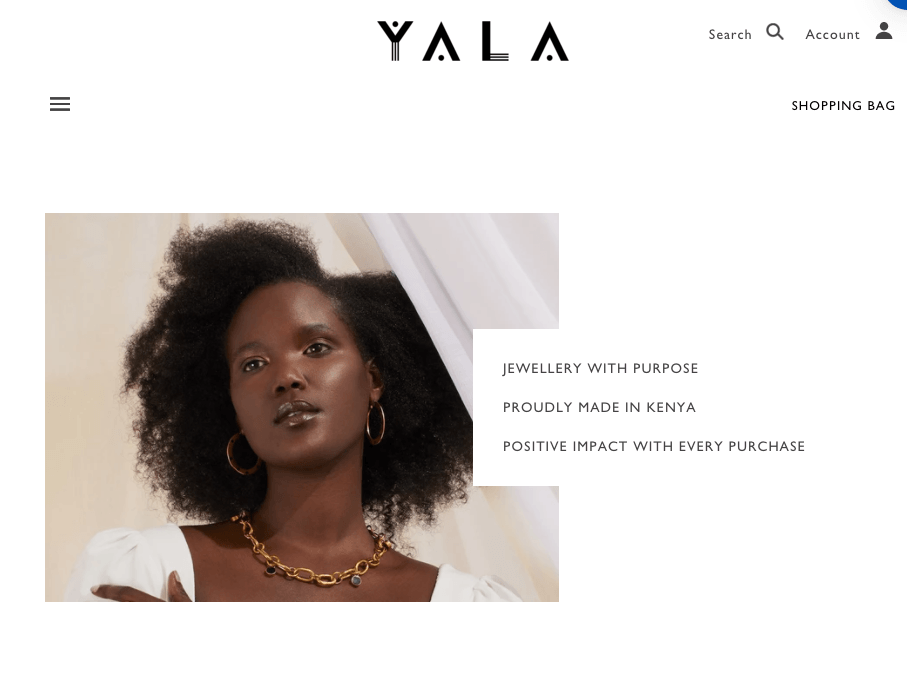
Yala is a modern jewellery brand that embodies intricate design, sustainable materials, an ethical approach, and transparency. It is female-founded and black-owned, with roots in Kenya. Yala is built on social values, with the intention of improving the lives of others by creating financial opportunities for skilled artisans.
It is the first jewellery brand in the UK to be a Certified B Corporation: leaders of a global movement of businesses that meet the highest standards of verified social and environmental performance, transparency, and accountability.
Wearth
Wearth use only recycled silver and gold to create their pieces and they have a zero-waste, vegan and cruelty-free policy.
Made
Made’s products are handmade by Kenyan artisans, and produced using reclaimed brass from the local area.
Cred
Cred use only fairtrade-certified gold, and also sell a range of lab-grown diamond rings.
Ethical Amazon Alternatives: For Clothes/Fashion
Clothing is something we can’t do without, despite the fashion industry being an especially exploitative one. From sweatshops to prohibitive labour laws, its negative impacts are numerous.
Here are some ethical options for fitness, clothing, and fashion:
Patagonia
As well as providing sustainable clothing, Patagonia has taken on a variety of ethical directives:
“From supporting youth fighting against oil drilling to suing the president, we take action on the most pressing environmental issues facing our world.”
It provides grants to grassroots environmental groups, and has pledged 1% of its total annual sales to the preservation and restoration of the natural environment.
As for the clothing itself, there’s a strong emphasis on repairing rather than replacing.
Good On You
Good On You was “created to use the power of people’s choices to drive a sustainable future.” It aims “to make sustainable shopping easy for millions of people around the world by being the best, most trusted source for brand ratings, articles and expertise on ethical and sustainable fashion.”
Good On You contributes to UN Sustainable Development Goal 12: “Ensure sustainable production and consumption patterns.”
Adrenna
Adrenna are a workout wear brand working towards zero waste production that is aiming to tackle mass-production in the fashion industry by offering custom made products.
Bam
Bam’s exercise gear is made entirely from bamboo! The big hitters of the ethical fashion world, People Tree and Patagonia, also have their own workout wear lines.
Ethical Amazon Alternatives: Prime (Shopping)
Prime is an attractive proposition for many shoppers, especially as Amazon will deliver many items within just a day or two. However, this puts a strain on local businesses and independent websites, which can’t match Amazon’s loss-leading tactics.
Shopping with Prime isn’t necessarily as cheap as you may have expected. Often, similar items are available in local stores for a similar price, and you’ll be helping the local economy, rather than a megacorp who pays next to no tax.
The point is, Amazon is relying on the fact that many users will stick with the service, even if it’s not the most ethical option.
The Ethical Shop

The appropriately named Ethical Shop is owned and managed by New Internationalist magazine. You can sort brands according to their values and/or chosen causes, and the company works closely with ethical, eco-friendly, and fair trade suppliers.
Ethical Superstore
Ethical Superstore guarantees fair prices at every stage of the supply chain. It stocks a range of fair trade, organic, vegan, and eco-friendly products. Every one of its products will have ethical credentials in at least one of the following areas:

Veo

Launched in June 2019, Veo aims to become “the earth-friendly Amazon”. It says:
“Veo is the UK’s most sustainable online shopping destination, showcasing thousands of unique products from over 150 independent brands across Fashion, Beauty, Food & Home. We don’t believe customers should have to compromise in their choices if they are wanting to shop sustainably, so at Veo you don’t have to.”
Secondhand Shopping
For secondhand buys, here are a few places you can check out:
- Preloved: an online store for all things secondhand, from furniture to clothes
- Oxfam Online Shop: Oxfam, the charity fighting poverty, raises money through its secondhand clothing stores and online shop for ethical-minded consumers.
EthEthical Amazon Alternatives: Alexa/Ring
Smart tech is almost always surveillance tech, and Alexa is no different. There’s a lack of transparency surrounding the service, while the device itself never stops listening to you. Amazon even employs people to sift through recordings, to ‘improve the service’, as reported by Time:
“Occasionally the listeners pick up things Echo owners likely would rather stay private: a woman singing badly off key in the shower, say, or a child screaming for help. The teams use internal chat rooms to share files when they need help parsing a muddled word—or come across an amusing recording.”
You shouldn’t need to be told why having a recording device in your house that is designed to always be on is bad for privacy.
In a similar vein, Ring security devices (including video doorbells) have a strong relationship with law enforcement, while the company was subject to a 2020 class action lawsuit “by more than 30 people in 15 families who say their devices were hacked and used to harass them”.
Once again, it’s a home recording device, but this time with a camera attached.
If you do plan to use Alexa/Ring, make sure to change your passwords regularly, use a password manager, and enable two-factor authentication (2FA) at the very least.
It’s still relatively early days for voice assistant technology, but there are a couple of alternative options being developed to rival Alexa in the long term:
Mycroft
Mycroft is the world’s first open-source voice assistant, which promises to never sell your data or feed you ads.
Gladys
Gladys is an open-source home assistant designed for smart homeowners; you’ll need a bit of tech knowhow to get the software up and running, but it’s growing into a capable tool.
Snips
Snips seemed a viable alternative to Alexa until November 2019, when media giant Sonos acquired the service for approximately $37.5 million.
Ethical Amazon Alternatives: Prime Video and Music
If you don’t want to support Amazon by using Prime Video, there are various streaming options available. Scoring high in Ethical Consumer’s UK video streaming rankings are:
Funkwhale

Funkwhale is a “community-driven project that lets you listen and share music and audio within a decentralized, open network”.
It consists of many independent pods which can communicate using standard, free, and open-source technology. The network is not tied to any corporation or entity, giving you independence and choice.
Resonate
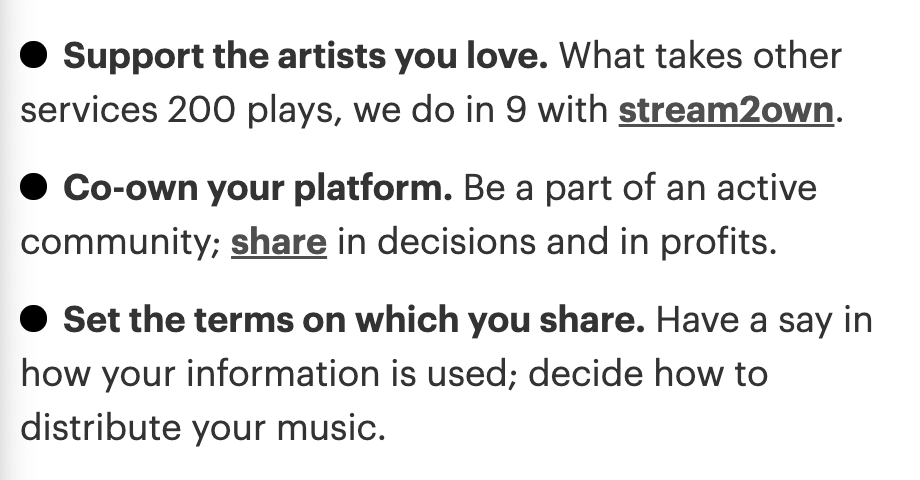
Resonate is building a new music economy based on fairness, transparency, and co-operation. As it notes, its model is unique:
“Contrary to virtually every other streaming service, Resonate is building our system open source. Being a cooperative, it fits with our ethos of openness and transparency, but we’re doing that for other reasons as well – overwhelming efficiency and prosperity.”
BBC iPlayer
British Broadcasting Corporation’s internet streaming platform BBC iPlayer (which you’ll need a UK TV licence to watch legally!) allows UK-based viewers to watch BBC programmes online.
All 4
Owned by Channel4, All4 is a video on demand service offering a variety of programmes recently shown on Channel 4, E4, More4, Film4 and 4Music.
BFI Player
BFI Player is a subscription service by the British Film Institute, to watch newly released films in the UK as well as old classics. The subscription is free for 2-weeks, then £4.99 a month.
Flix Premiere and MUBI are also recommended indie film subscription services.
Amazon Prime Music gives users access to 2 million songs and over 1000 playlists and stations. But there are Amazon alternatives to replace the behemoth. For example, Resonate is a community-owned music network that pays artists at higher rate for streams—what takes other services 200 plays takes them just nine. They operate with a pay-as-you-play model, with no monthly fees.
Ethical Amazon Alternatives: Kindle
Since it was first released in 2007, the Kindle has helped to cement Amazon’s position as ‘the world’s largest bookseller.’ But the books sold through Kindle are also under a severe restriction, called DRM (Digital Rights Management). This means that Amazon can edit or remove the ebooks that you’ve bought at any time—they’re never truly your own.
Kobo
Tech hardware is, of course, currently almost impossible to produce ethically; but with regards to data ownership and privacy, your best of the Amazon alternatives is probably Kobo, which sells DRM and DRM-free eBooks as well as eReaders.
Note that there’s no option to differentiate between the two when searching on the site, but the Switching Social project have built an unofficial search page here!
Libro.fm
If you live in the US or Canada, you can also buy DRM-free audiobooks at Libro.fm. And as the audiobooks are purchased from a local indie bookstore of your choice, you’ll also be investing in your community at the same time.
Web hosting, online shopping, video and music and voice assistants are the main pillars of Amazon’s business, but this is by no means the only areas they’re active in: for a full list of Amazon-owned businesses (including Twitch, IMDb and Goodreads), see here.
If you plan to buy an e-reader or tablet, we’d advise looking at refurbished secondhand models, to lessen overall environmental impact.
Over to You
It may feel like voting with your wallet is futile—but boycotting unethical companies, and, crucially, convincing others to do the same, are the first steps in driving the cultural change that will compel politicians to take action. After all, only after public outcry in the wake of the Cambridge Analytica scandal are regulators seriously considering the tech giants as monopolies which must be broken up.
Some organisations lobbying for Amazon to change its ways are:
Global Tax Justice: campaigning for greater transparency, democratic oversight and redistribution of wealth in national and global tax systems
Institute for Local Self Reliance: the ILSR challenges concentrated economic and political power
China Labor Watch: dedicated to workers’ fair share under globalisation
Privacy International: a charity that challenges the governments and companies that want to know everything about us
And some further reading:
Amazon’s Stranglehold: How the Company’s Tightening Grip is Stifling Competition, Eroding Jobs and Threatening Communities
Amazon Profits From Secretly Oppressing its Supplier’s Workers: An Investigative Report on Hengyang Foxconn
Update
This guide was updated on 4 January, 2022.



















Leave a Reply